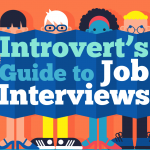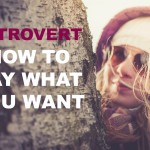Have you ever felt like people disrespect you because you’re introverted? They assume that because you are quiet you don’t know how to stand up for yourself. They think you’ll just sit there and take their unfair behaviour, as if it were sweet medicine … and maybe you do.
I don’t blame you.
I completely get why you would choose submissive niceness or avoidance over standing up for yourself. We introverts are naturally conflict-averse. We are the anti-drama queens and kings, who will do anything to maintain peaceful waters. But there’s a problem with this approach.
Not knowing how to stand up for yourself is like taking slow-acting poison. Tolerating people who disrespect you corrodes your sense of self-esteem. Not only that …
It also plants a little black seed of resentment. Each time a person puts you down or pushes you around, that seed sprouts thorny vines of anger. If you’re an introvert, these prickly resentments often stay quiet and hidden away, where the only person they can hurt is you. Or so you think …
The truth is that when you don’t know how to stand up for yourself as an introvert, your anger might come out in passive aggressive ways. Author Martha Beck explains:
The problem is that trying to change unfair behavior with submissive niceness is like trying to smother a fire with gunpowder. It isn’t the high road; it’s the grim, well-trod path that leads from aggressive to passive, through long, horrible stretches of passive-aggressive.
The solution?
Learn how to stand up for yourself
Well, of course the answer is to stand up for yourself before the black seeds of resentment have the chance to sprout. But here’s the thing.
When you’re quiet, introverted, and conflict-averse, this whole assertiveness thing does not come naturally. It goes against our peaceful nature — or so we think.
In reality, knowing how to stand up for yourself actually prevents conflict in the long run, especially when you know the steps to do so without being aggressive or passive-aggressive.
You’re in luck because today I’m sharing the steps to stand up for yourself, even if you’re introverted and hate conflict. These are the very same steps I used a few weeks ago to quickly and painlessly stand up for myself during a family get together.
You see, I was spending time with family members that I hadn’t seen in a while and a couple of them saw our reunion as an opportunity to scrutinize and criticize my vegan diet and my “skinny” body. My reaction surprised even me because a couple of years ago I probably would have responded totally differently.
I would have silently taken the criticism, even though I knew it was unfair and made me feel uncomfortable. Or I would have skulked away in shame, thinking that I was at fault somehow.
Both reactions would have only fed the vicious cycle of unfair behaviour and silent resentment. Instead, I did something that ended the criticism in an instant, without creating conflict.
Here’s how I did it, and how you can stand up for yourself, too:
1. Be clear on who you are and what’s important to you.
The reason why you don’t know how to stand up for yourself could be that you struggle with self-doubt. When you’re unclear on your values, it’s hard to defend them. It takes a lot of self-reflection to discover what is truly in important to you.
Your next task is to continually revisit and reaffirm these beliefs and values so you know how to protect them when they are under attack. When I first decided to follow my current diet, for example, I was not as confident in my new lifestyle as I am now. But after several months of research and practice, I have no doubt that this way of eating is right for ME, regardless of what others think.
The same goes for my introversion. At first, I thought that there was something wrong with me because I was quiet, and liked to be alone. When others told me that my behaviour was weird, I believed them. Now that I know my introversion is nothing to be ashamed of, I would never tolerate anyone ridiculing my quiet nature.
2. Develop authentic confidence.
It takes courage to stand up for yourself, especially when you are bullied by louder, and more aggressive personalities. When you are truly confident in who you are — meaning that you have a strong sense of self-love and self-respect — you will have the courage to hold your ground against those who try to disrespect you.
Confidence is like kryptonite to bullies. They will always choose easy, passive prey over someone who stands up for themselves from the get-go.
I have to be honest, developing authentic confidence takes time, especially if you’ve spent most of your life feeling different. I can help you get started with my free introvert confidence lessons, which you get when you subscribe to my mailing list.
3. Do activities that make you feel empowered.
Knowing how to hold your ground is a practice that begins in both mind and body. That’s why many physical activities can make you feel surprisingly empowered. Everything from yoga, to kick-boxing, to dancing, to painting murals, can teach your body to choose strength over passivity.
If you’re not the athletic type, you could start with a few simple power poses, which have been scientifically proven to boost confidence.
4. Express yourself without being aggressive or avoidant.
As you probably already know, there is a fine line between respectfully standing up for yourself versus lashing out at the other person. In the heat of the moment, it can be hard to decipher where that line is.
On the other hand, since introverts hate conflict, you might be more avoidant than aggressive. This won’t get you very far either. Here’s how to stand for yourself without being too aggressive or avoidant:
Focus on expressing how the other person’s behaviour makes YOU feel. Instead of saying “you’re being a jerk,” say something like, “I feel put on the spot, I don’t like feeling this way.”
This is exactly what I did when family members were criticizing my diet and body. I said “this is making me feel uncomfortable, and I don’t like it.”
For some bullies, this is enough. If they persist, you might have to get more firm and direct by explicitly telling them what you don’t like about how they are treating you, and what you would like instead: “I do not like being insulted, even if it’s a joke. Please be more considerate of my feelings.”
As scary as it may sound to utter the above phrases, it is surprisingly natural when you truly love and respect yourself. The best part is that you don’t need to be long-winded. This is a relief for introverts who tend to be word economists.
Less is more when it comes to assertive communication. After all, no one likes to be lectured for hours on end. When you are direct and honest, your message is heard loud and clear from the first sentence.
5. Release and move on.
Now that you know how to stand up for yourself, it’s important to remember the final step. Instead of staying stuck in a state of defensiveness, let go of your anger, and move on. This might mean allowing the conversation to drift back to more casual topics, or taking a walk to clear your head.
You’ll be surprised at how easy it is to move on once you’ve expressed your feelings in a healthy way. You’ll also be shocked at how swiftly the other person’s behaviour towards you changes. This is especially true if you stand up for yourself sooner rather than later.
It’s like that old saying goes, you teach people how to treat you — so it’s best to start the training as soon as possible!
The aftermath
After I stood up for myself at the family get-together, the conversation quickly moved on to other topics. There was no yelling, or tears, or silent treatment. Within minutes, it was as if there had never been an issue. And here’s the best part.
No one from my family has criticized any aspect of my diet or lifestyle since, even though we’ve shared meals together. Had I not known how to stand up for myself, I could have faced years of inconsiderate comments about my lifestyle choices.
Your turn
I assure you that the above steps for how to stand up for yourself work like magic, especially if you’re an introvert like me. But I hope that you won’t just take my word for it.
Please do try these steps out for yourself. Don’t wait until an uncomfortable situation arises to begin. Start to develop confidence and communication skills today, so that you naturally know how to stand up for yourself in the face of bullies and critical loved ones.
I’d love to hear your experience with this
Before you go, please do share your thoughts and experiences related to standing up for yourself as an introvert. I’d love to hear your insights in the comments. 🙂
xo,














Loving the article Michaela! As someone who is transitioning to a vegan diet, I too faced what you experienced with your family, and how you handled is spot on! 🙂 An truly wonderful article!
Describes me all too well. Good timing. Thank you for this blog post.
Thank you Michaela, will be trying these steps out and sharing with others in need, much appreciated!
Thank you so much for this article. Next time I feel uncomfortable with how someone is speaking to me I am going to try this approach. And Michaela, your diet and lifestyle are clearly a good choice for you as you look very healthy and beautiful ☺
I am in my seventy-fifth year of being an introvert so the challenges of my younger days are far different than what I face now.
Buried deep in my memory banks are those feelings of awkwardness, exclusion and resentments that you write about. Due to my intense curiosity about life and my passion for learning new things, I have ventured along many esoteric avenues which brought criticism from others.
Some thought of me as being stone-faced and others just weird. In my teens and twenties, I often bent to others opinions just so I could feel a part of what was going on. In my thirties, I took the bit in my teeth and ventured into public speaking. It was terrifying at first but I soon became quite confident as my skills developed.
At that point I went back to school and trained as a counsellor. People soon came to realize that although I am quiet in many situations, I can be a font of information when called upon to share.
I still avoid conflict and either try to find the common ground in challenging situations or silently bathe myself in gratitude that I don’t have to express an opinion on everything to everyone.
I appreciate your writing and the reminders of struggles I used to know. Any challenges I now face are treated as opportunities to learn more about my fascinating world.
Beautiful story
yes indeed, thank you
Hi, u r right we are indeed are word economist. When expressing myself, I always go straight to the point, instead of telling some background or introduction.
So in the those kind of situation that you mentioned, what is the best word to use to tell him/her that you are uncomfortable with his comment.
Can I say something like, “I’m offended by that remarks” for example. Or may be something less less explicit.
I like, “This makes me feel uncomfortable/bad/put on the spot” because these are less likely to put the other person on the defensive. 🙂
I’ve been ruminating over one family member who made a joke about my hair being short (shaved head look). The funny thing is my hair has been this style off and on for literally the past 20 years. After a few minutes she poked fun at me having milk instead of a beer. I didn’t take it as a joke but some sort of assertion to make herself the alpha-person at the table. I said nothing and kept quiet. WRONG! I should have spoke up especially about the beer. I’m taking medication for 3 chronic illnesses. I chose not to drink for my own health. People can be so myopic with their comments. This person is a social worker and has a high opinion of her opinions … very self righteous. She has very little wiggle room in accommodating view points that do not fit her own views.
people can be a pain – read somewhere that we should see that as just them, and not about us…
A social worker! She should be ashamed at her lack of empathy. You sound like a wise man – keep on being you.
Thank you for these tips. I will definitely use them the next time I’m visiting my family.
A really good article, and timely. Thank you!! <3
Great post Michaela! I’ve had a lot of similar experiences with friends and family whenever I took a road less traveled, and predictably faced a barrage of critical opinions from all directions.
What finally gave me some peace was to realize that holding an opinion does not infer any responsibility for the outcome of the actual decision. In other words, it is easy to have an opinion when somebody else has to live with the consequences of that decision – so I openly welcome all advice, and take it with a healthy grain of salt 🙂
Thank you very much Michaela for the article, i’m going to practice the steps you just mentioned. It really helped me a lot. God bless you.
This right here explains my estrangement from certain people in my family. I wish I had these tools years ago. Is it possible to fix these broken relationships. (The others would never take the first step). Thanks Introvert Spring
I am so happy to have these steps, God bless you Michaela
Thank you for all of your articles. Your descriptions of introverts are exactly correct. Your own experiences mirror mine almost identically. At 50, I now realize I am an introvert and there is nothing wrong with me. Your posts always confirm this and they have given me healing, confidence, and pride in myself. Thank you.
Thanks, Michaela, for the wonderful article. We introverts don’t have it easy in confrontation, very true. And standing up for myself is something that I’ve been working on. Thanks for the tips!
Really great tips! Thank you! I’m sure I’ll have an opportunity to practice in the near future since extended family will be visiting for a family wedding.
Love this!!! Thank you so very much for who you are and what you do, Michaela. 🙂
I have no words to thank you Michaela for this post. I have been the butt of everyone’s jokes for many years. I tried so hard not to be introverted but it was and still is impossible. I was unable to stand up for myself as my friends bullied me for more than 12 years for being a single and old woman (30 something)— that’s almost a crime in India. My girl friends told me I needed to be smart enough to “answer back” these men on the spot, but I could not do that ‘coz I think too much about the logic of my statements. Anyway, when I finally gathered enough guts to tell these “highly respectable” men that I was being hurt, and they needed to stop their ugly jokes, they laughed all the more at me saying I was just a touchy, weak woman. Finally, I took two of the most aggressive men aside in a room and shouted at them, and that’s when they finally stopped teasing me. One of them continues to be my friend, the other doesn’t speak to me anymore. Even at home, a younger, highly extroverted sibling often referred to me as an idiot, even though my GRE scores were higher than hers and I had a better paying job. I even typed most of her PhD thesis, but all I still hear is that I am dumbo because I do not party late into the night or have one million friends or like to doll-up and attend those big, fat Indian weddings. Fortunately, we live in different parts of the world, so she cannot stress me out anymore! I agree with all the steps that you have given above, but sometimes #4 does not work with Indian men. Or maybe, I needed to be more assertive and less logical.
calmly tell them your position without getting emotional or yelling? perhaps the effect would be more powerful. I have been in a similar position with a young male colleague, and when I tried to be domineering to him to tell him not to be rude to me, he got worse. But when I am calm and don’t get upset, but just tell the boss, he has to improve…
I do answere back,but it tends to be something as scathing as the first response which makes matters worse,but I don’t back down(that’s to my boss)with my brother,I tend to let him vent,it’s his way,and he usually appologises after
As both an only child and an introvert, I have always found standing up for myself very difficult. My mother was somewhat controlling, and standing up for myself was seen by her as “bad” and “naughty”; I should be a “nice, good” girl and do what others wanted and accept their opinions about myself. I think this is a problem for a lot of women, being brought up to be nice and just take what others throw at us, quietly and meekly. I’m nearly 60 now, and still find standing up to bullies difficult, but the difference is that now I’ve had so many years of other people’s bullshit that I really don’t care anymore. I don’t care if they think I’m not “nice”; I’m not here to live up to other people’s expectations. I recently managed to extract myself from a potentially harmful relationship with a manipulative man by literally walking away from him and blocking all contact. He now knows that I am not a “nice” person at all, so there’s no point in him continuing with me.
My go to response = Keep it up, they will never find your body.
Thank you for sharing this information. Reminds me of the training we received at work on ‘courageous conversations’. It’s hard to speak up, but when you do the results are usually positive as long as you speak up in a non-confrontational way. It’s amazing how keeping the words simple, personal and non-confrontational can turn a conversation and clear the air of negativity. And thankyou to everyone who shared their experiences in this blog. It reminded me of the effectiveness of this technique and that I need to use it when needed and not revert to my normal response of saying nothing and putting up with it.